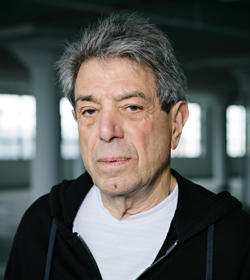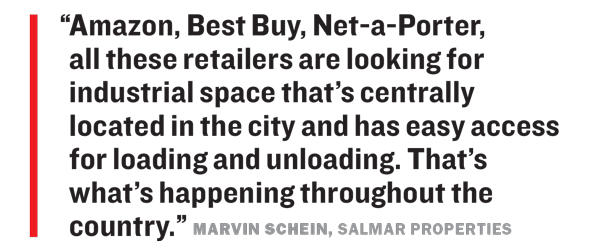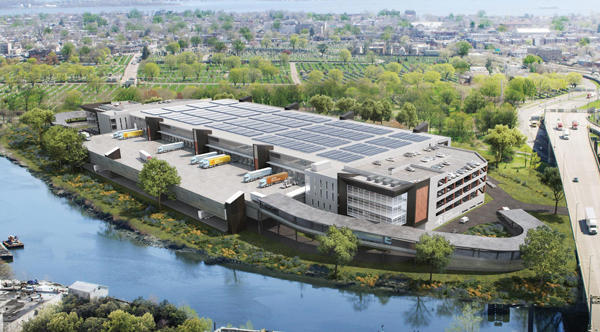When Andrew Chung left the Carlyle Group to launch his own company four years ago, multistory industrial space for e-commerce companies was virtually unheard of in the city.
“It wasn’t even an option to consider,” Chung said.
Not until mid-2016 did his new firm, Innovo Property Group, begin looking into urban warehousing in the outer boroughs while other investors continued to put their chips on luxury condos, trophy office towers, hotels and apartment buildings.
That’s when Chung discovered a huge underserved market for deliveries on demand in New York. “We get more and more compelled every day,” he said.
In 2019, though, he isn’t the only one. A small but growing number of real estate players — many of them flying under the radar — see a city of millions of e-commerce customers who increasingly expect products to arrive they same day they hit send.
Other investors in this nascent market include Dov Hertz, once luxury high-rise developer Gary Barnett’s right-hand man, whose accomplishments include piecing together most of the parcels for One57 — the pioneering condo tower that established West 57th Street as “Billionaires’ Row.” Another firstcomer is Marvin Schein, who’s looking to rent four floors at his Liberty View Industrial Plaza in Sunset Park to the next wave of online merchants looking for distribution space.
So-called last-mile warehousing space can attract rents exceeding $30 a square foot, according to several investors in the business. That’s akin to what outer-borough office landlords were asking just a few years ago.
And a source familiar with the matter told The Real Deal last month that Joseph Sitt’s Thor Equities is scrapping plans for a Norman Foster-designed office complex on the Red Hook waterfront to build an industrial distribution center there instead. A spokesperson for Thor declined to comment.

Marvin Schein (Photo by Axel Dupeux)
“This is a very new phenomenon,” said Rob Kossar, head of the Northeast industrial region for JLL. “For same-day delivery, it’s impossible to deliver to Brooklyn and Queens from New Jersey. It doesn’t work. It takes too long, and it’s
too costly.’’
One click away
At Liberty View — now to home Saks Off Fifth, Bed Bath & Beyond and other stores — Amazon occupies 60,000 square feet in the 8-story complex. Stacks of paper towel rolls, bleach wipe dispensers and a world of other miscellaneous merchandise waits to be loaded onto trucks heading to millions of consumers in the city.
Schein’s Salmar Properties bought the 1.1 million-square-foot building for just $10 million in 2011. The property, then a derelict government leftover that had lain vacant for nearly two decades, was originally built as a naval supply center in 1916. And to make the sprawling building more desirable to prospective tenants, Schein and his partner, Sal Rusi, poured about $140 million into infrastructure upgrades, including a new facade and automatic elevators.
Back then, Salmar wanted to make Liberty View a refuge for manufacturers that were being priced out of Manhattan’s Garment District. That plan never came to fruition, though.
“It turned out that garment workers wanted to stay in the city,’’ Schein said. “They felt that if they moved out, they would lose their relationships with the European and American buyers that frequent Manhattan.”
After that, some banks and other financial firms became interested in leasing the space for back offices, he noted. But the zoning only allowed for industrial uses, and local warehousing tended to stay along the New Jersey Turnpike, where single-story properties with 35-foot ceilings could be built at a low cost.
With 12- to 15-foot ceilings in Sunset Park, Schein and other developers couldn’t even begin to compete for manufacturers looking for way stations to deliver goods to stores. Even Amazon — which recently backed out of bringing half of its “HQ2” to Long Island City — has kept its fulfillment centers outside major cities and close to superhighways.
Increasingly, though, the e-commerce giant and its competitors are using smaller facilities like the one at Liberty View to service customers even quicker, Schein said.
 “Amazon, Best Buy, Net-a-Porter, all these retailers are looking for industrial space that’s centrally located in the city and has easy access for loading and unloading,” he maintained. “That’s what’s happening throughout the country.”
“Amazon, Best Buy, Net-a-Porter, all these retailers are looking for industrial space that’s centrally located in the city and has easy access for loading and unloading,” he maintained. “That’s what’s happening throughout the country.”
Industrial vacancies nationwide have dropped to a historic low of 4.3 percent, and pressure to build new spaces will continue into the foreseeable future, per CBRE’s Outlook Report for 2019.
Meanwhile, 95 percent of the roughly 2.5 million square feet of industrial space leased in New York in 2018 was for e-commerce and logistics companies, according to JLL. There’s now more than 700,000 feet of new warehouse and other industrial space being built throughout the city and another 4.8 million feet proposed, JLL’s data shows.
And a recent report from PricewaterhouseCoopers and the Urban Land Institute noted that just-in-time delivery, the standard in business-to-business shipping for decades, has now spread to business-to-consumer sales. PwC found in a survey that 41 percent of consumers are willing to pay extra for same-day delivery, and another 23 percent would pay extra for delivery in three hours or less.
But one New York commercial landlord, who asked not to be named, said that given the costs of building multistory warehouses from the ground up, some investors may be looking to charge a premium rent that could be hard to achieve. Many e-commerce tenants may end up flocking to the city’s older stock of industrial space to save money, similar to what some new office buildings in the outer boroughs have seen, the landlord noted.
Compared to most gateway cities, though, New York is likely “under the average square footages for this type of space,” said Brian Leary, a managing partner of Brooklyn-based CPEX Real Estate, which has brokered a number of industrial leases.

2505 Bruckner Boulevard
“The demand is for a very specific type of space that is very limited, and it’s probably more effective to build that space ground-up,” he said.
Plan D?
For Hertz’s development firm, DH Property Holdings, last-mile deliveries are too exacting a need to service from existing warehouses.
So he and his partners are planning to build a new four-story distribution center at the 18-acre Sunset Industrial Park. Once the 1.4 million-square-foot facility is completed, delivery trucks will be able to drive up on ramps and load and unload on each floor.
Hertz and a handful of other investors, including Chicago-based Bridge Development Partners, Dallas-based Banner Oak Capital and the Texas teachers’ pension fund, paid $255 million for the site in January. And to make way for the distribution center, Hertz said, they will tear down 20 “Class C industrial buildings” totaling about 400,000 square feet.
When he left Barnett’s Extell Development Company in 2016, Hertz said, he had no idea that last-mile industrial property was going to be his meal ticket. He had weighed luxury residential, which struck him as glutted, and retail, which was on the decline, and he said he didn’t know enough about the hotel business.
“In doing my homework, it occurred to me that as e-commerce picked up, distribution facilities were going to be the new retail,” the developer noted. So he then spent several months touring various warehouses in the five boroughs.
“I realized, after talking to people on the brokerage side, talking to architects who were involved in that business, the existing industrial stock was not going to meet the needs for last-mile distribution,” Hertz added.
Meanwhile, Chung’s Innovo and its partners Atalaya Capital Management and Nan Fung Group of Hong Kong paid $75 million in January for an old warehouse in LIC that they plan to renovate and lease out. The property had previously been leased by the online grocer FreshDirect.
That deal came on the heels of Innovo’s announced plans to build a multistory warehouse at 2505 Bruckner Boulevard in the Bronx, and its acquisition of a 150,000-square-foot warehouse in Maspeth, Queens, last year.
Chung said he sees modern industrial real estate as the biggest growth opportunity across all commercial property types.
“E-commerce is 10 to 12 percent of all retail, and it’s growing in the double digits,” he said. “We look at demand factors. And that’s a demand factor we don’t see slowing down at all.”
